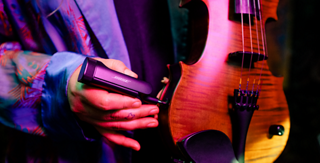Stadiums, arenas, and larger venues typically feature in-house PA equipment to ensnare audiences with powerful audio. However, everyday working musicians who go to perform or busk may need to bring along a portable PA system. Smaller venues might not have any equipment at all, or what they have may be of poor quality.
Bigger isn’t always better. Inexperienced musicians might believe they need a giant PA system to sound professional, but in many circumstances, large speakers can be overkill. You don’t want to spend too much money on something unnecessarily bulky when more compact options are available. A portable Bluetooth® PA speaker can make it easy for you to perform anywhere.
Solo performers certainly don’t need the extra stress of lugging around heavy speakers and tangled wires. If you’re a singer with a guitar playing in bars and restaurants, you likely don’t need a cumbersome 20-inch speaker. Instead, consider a more lightweight speaker, such as the Bose S1 Pro+ Wireless PA System, which you can easily carry into any venue. Portability comes in handy for groups, too. Suppose you’re in a small band — rather than your bassist or keyboard player bringing their own amps, they could connect directly to your PA system.
Much like the phone in your pocket, the technology inside PA systems improves over time. Musicians understandably tend to focus on sound quality — but also consider how certain features can help make the technical side of your job easier, allowing you to focus on giving the best possible performance.
Bluetooth connectivity can link your headphones to the PA system for mixing purposes and quality control. This is a beneficial feature if you’re playing in a crowded venue; without Bluetooth capabilities, you might struggle to hear yourself playing over the sound of audience chatter, glasses clinking, and doors opening and closing. Using Bose transmitters (sold separately), you can connect the microphone and instrument to the S1 Pro+ Wireless PA System so you can move around the stage effortlessly.
Remote control via an app, such as the Bose Music app, can be helpful as you adjust the tone and sound — no need to hunch over your PA system. This type of flexibility can give you the freedom to make on-the-fly adjustments to optimise the experience for your audience.
Some musicians opt for 8-channel mixers, but you can get an updated portable PA system with built-in mixing abilities. If mixing is a big priority, you could choose a mixer and download various apps to adjust the tone and sound. Alternatively, you might choose a portable Bluetooth PA speaker that can address the basic settings, such as treble, as well as effects like reverb and delay.
Bands often require robust mixing options, such as the ability to turn up the bass if other instruments are overpowering the sound or turn down the lead guitar a notch during a particularly intense solo riff. Mixing used to be entirely analog but leaving knobs and faders behind for an integrated wireless mixing option can make mixing that much simpler.
Larger PA systems often plug in directly to a wall outlet. This is typically a safe option — you know the system will work as long as the venue doesn’t lose power, such as in the event of a storm or blowing a fuse. However, plug-in power is often unnecessary. Portable Bluetooth speakers can last longer than your vocal cords without requiring any electric cords. The Bose S1 Pro+ Wireless PA System’s rechargeable battery lasts up to 11 hours, giving musicians plenty of time to put on an excellent show.
Wireless also becomes a necessity when venues don’t have the option of an electric power source, like busking, for example. If you want to jam out on a pedestrian street and collect tips, battery-powered PAs are the way to go. You might have the option to plug into a generator at larger outdoor venues, such as concerts in a park; however, the noise from the generator can drown out your music, meaning that a battery could also come in handy.
Every musician has a different budget and requirements for their PA system. Your resources and needs will also probably change throughout a long career. Early on, you may buy the least expensive possible option. But as cheap systems break and your career grows, you may choose to invest in higher-quality equipment.
Having a system that’s intuitive and easy to use allows you to focus on your craft. If you grew up with analog equipment, using a digital app to control your PA system could have a learning curve, but its functionality really brings out the benefits of evolving the technical aspects of music.
If you’re playing at a pub, you want to avoid pushing past customers as you enter the venue with armfuls of gear. Having a portable system you can carry on your own and set up in a few moments can save you time and stress. A plug-and-play style system makes the setup process easier for you, your bandmates, and the audience.
Longevity matters, so you’ll want to choose a durable system that lasts. Of course, musicians try to handle equipment with care, but the nature of a portable system means it will need to withstand multiple trips to various locations. Superior materials and thoughtful design can make the difference between a speaker that blows out after a few months and one that lasts several years.
Ultimately, sound quality is paramount. The whole point of a PA system is to ensure the audience can hear your music from a distance. Well-made speakers will bring your voice or instrument to the back of the pub or wherever you perform. The underlying technology and engineering are often invisible in sleek systems, but you — and your audience — will hear the difference.

















